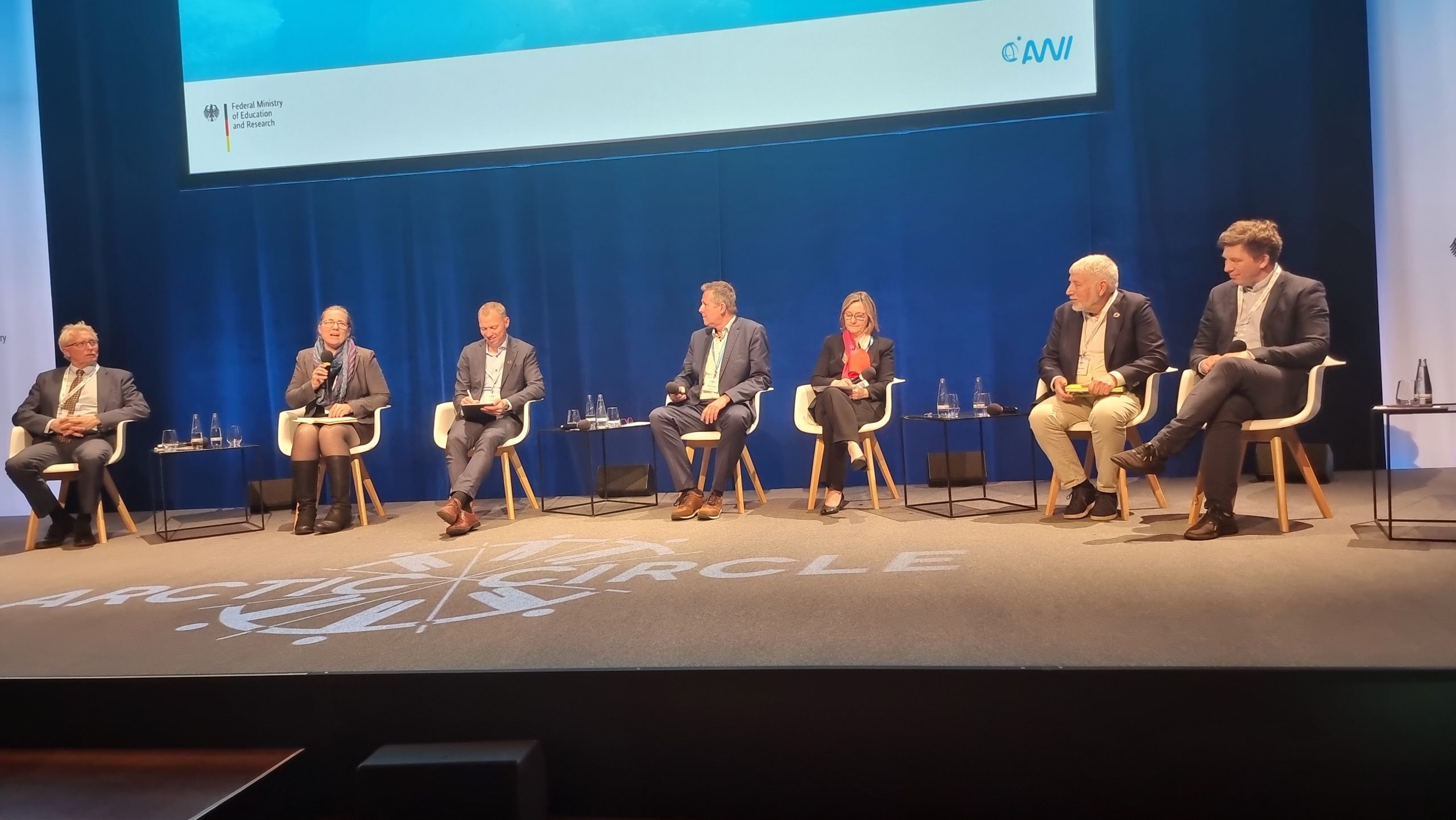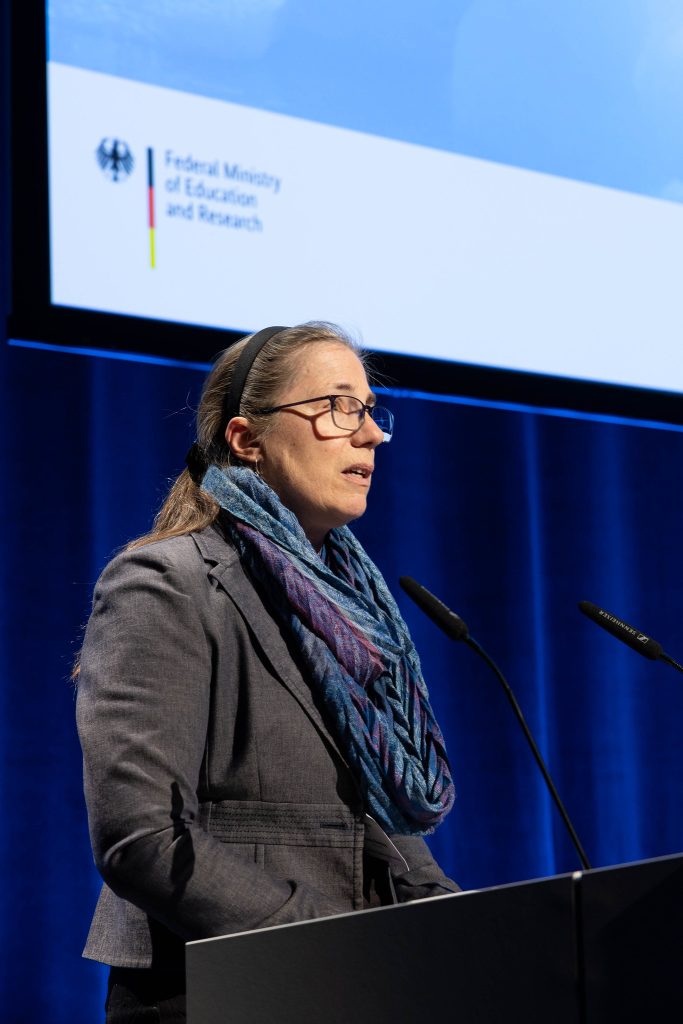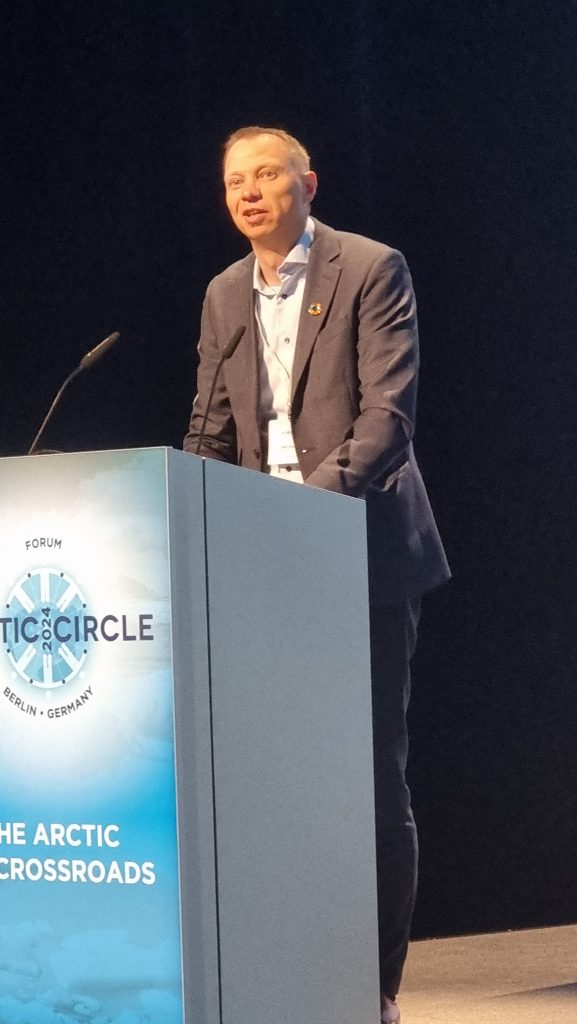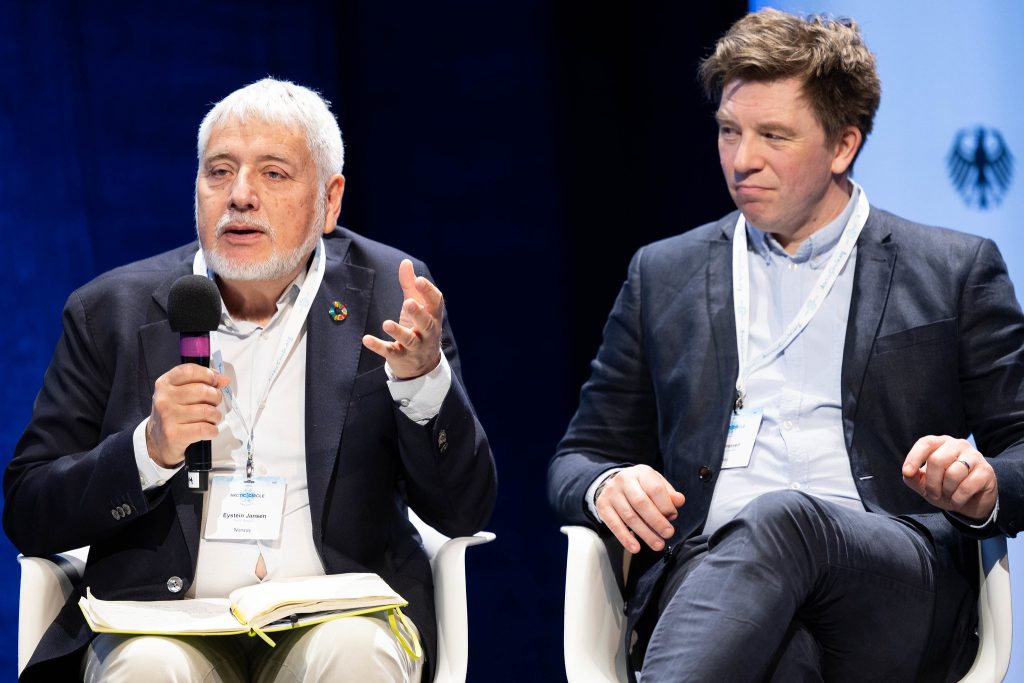
Panel discussion at Arctic Circle Berlin Frode Nilssen, Melody Brown Burkins, Rolf Rødven, moderator Volker Rachold, Clara Ganslandt, Eystein Jansen and Ole Øvretveit.
Working group members, as well as external keynotes and commentators, offered new perspectives to the “Rethinking Arctic Collaboration”-project from Academia Europaea Bergen, when the project was presented at a session at Arctic Circle Berlin, May 8th. The panel discussion also added new context.
The first keynote of the session was from Melody Brown Burkins, Director of the Institute of Arctic Studies at the John Sloan Dickey Center, Dartmouth.
– What you’ll hear today during our session is that, even in our group, we are not all defining science diplomacy and cooperation challenges in the same way, but we all want to see a future with shared Arctic science diplomacy goals. We want to see if we can learn what paths to future Arctic science cooperation will work. And we want to see Arctic science done with just, ethical, and inclusive Arctic governance, Melody Brown Burkins said in her introduction.
She highlighted that an ethical and equitable future for Arctic science diplomacy would have to include Arctic Indigenous Peoples in both knowledge creation and diplomatic decision-making.
Two objectives
She described the foremost challenges of future models of Arctic science diplomacy to be ensuring primarily two objectives:

Keynote from Melody Brown Burkins.
– The practice of science consistently, ethically, and equitably includes the engagement of diverse knowledge systems – most specifically Arctic Indigenous Knowledge systems – to inform Arctic policy, and:
– The practice of diplomacy consistently, ethically, and equitably supporting governance models where leaders of recognized Arctic Indigenous Peoples organizations wield decision-making power alongside leaders of Arctic Nations.
– This is a goal for Arctic science diplomacy we can address now, regardless of full Arctic Council cooperation, Melody Brown Burkins said.
On the situation resulting from missing Russians climate data following the current sanctions, she said:
– I do not think more climate data is the sole answer to the existential threat we are facing of a warming earth, eroding coastlines, permafrost thaw, sea level rise, the loss of sea ice, and the rise of powerful storms across the globe. Because we know what the science is telling us. We have known what the science has been telling us since the 1950s. We need to move to low-carbon, net zero economies as soon as humanly possible.
The second keynote of the session was Frode Nilssen, professor at Nord University Business School and research professor at Fridtjof Nansens Institute.
– The current change in the geopolitical situation affecting Arctic collaboration have been taking place gradually over the last two decades. This is not a new situation, even as it has been amplified by the terrible, Russian aggression in Ukraine, thus creating an entirely new situation, particularly in the European Arctic, Nilssen emphasized.
Nilssen drew a parallel between science diplomacy and another, continuing collaboration between Norway and Russia, namely the joint fisheries commission, deciding on the annual quotas of the fish stock.
– This collaboration rests on scientific advice drawn from solid research over time and has also been able to continue during the current sanction regime, Nilssen said.
Identify both mechanism and motivation
The final keynote was Rolf Rødven, Executive Secretary of the Arctic Monitoring and Assessment Programme, AMAP.

Rolf Rødven, Executive Secretary of the Arctic Monitoring and Assessment Programme.
– In the internal talks at AMAP, the discussions about continued scientific collaboration with Russia boiled down to defining scientific integrity as our most important asset. Whatever we wanted to do, we needed to make sure that our scientific integrity was maintained. For instance, we would resist any pressure to exclude Russian co-authors from scientific papers, as that would constitute scientific misconduct, Rødven said.
– If we would like to resume a full pan-Arctic cooperation including Russia, and the need to understand the impacts of rapidly warming Arctic is the reason for doing so, we would need to identify both the mechanism and the motivation. The legally binding Agreement on Enhancing International Arctic Scientific Cooperation provides such a mechanism, and to join efforts towards the International Polar Year in 2032 in meeting the most important challenge for our Arctic future may be such a motivation, Rødven added.

Academic director of Academia Europaea Bergen, Eystein Jansen, and project manager Ole Øvretveit, at the panel discussion. Foto: Bundesfoto/Bernd Lammel
In her introductory comments to the panel, Clara Ganslandt, Special Envoy for Arctic Matters, European External Action Service, said:
– This session has been enlightening on the complexities of the current geopolitical situation, when also intersecting with the global threat of climate change.
Academic director of Academia Europaea Bergen, Eystein Jansen, also had introductory comments to the panel:
– It is easy to become pessimistic about the role of science diplomacy today and whether the concept has any meaning at all. Taking part in conversations here at Arctic Circle Berlin, I’m convinced that there still is a role for science diplomacy. Continuing to do scientific research the way it should be done, will create a space for science diplomacy, Jansen said.
Additional avenues
– Also important to consider, is that there are more avenues for science diplomacy than just collaboration with Russia. Organizations like IPY, IPPC, AMAP or the UN system still operates and some of these may be able to provide avenues for cooperation with Russia further down the line.
In the following panel discussion, Clara Ganslandt pointed out several organisations where science diplomacy is still happening and functioning:
– In my view, projects like the All-Atlantic Ocean Research and Innovation Alliance, the EU Polar Cluster, The Sustainable Blue Economy Partnership and also the G7 Future of the Seas and Oceans Initiative are examples of science diplomacy that is ongoing and working, Ganslandt said as part of the panel discussion during the session.
More on the “Rethinking Arctic Collaboration”-project from Academia Europaea Bergen.
